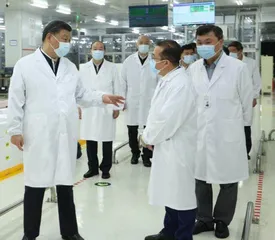Chinese People’s Political Consultative Conference : China’s Practice in Consultative Democracy
作者: Zou Jiayi

Whole-process people’s democracy is the defining feature of socialist democracy. Rooted in the rich soil of the five-thousand-year Chinese culture, as a unique and original form of socialist democracy, consultative democracy is an important way by which whole-process people’s democracy is practiced. It is a great creation of the Chinese communists and the Chinese people. The Chinese People’s Political Consultative Conference (hereinafter referred to as the CPPCC) is a crucial channel and specialized consultative body for socialist consultative democracy. With its full-fledged institutional procedures and participatory practice, the CPPCC plays a key role in promoting whole-process people’s democracy.
Public Matters Decided Through Discussion: the Concept of Consultation in Whole-Process People’s Democracy
As pointed out by General Secretary Xi Jinping, under the socialist system in China, public matters should be discussed and decided through consultation to find the maximum common denominator of social will and demand, which is what people’s democracy is really about. In China, consultation is a cultural concept, a way of participation, and more importantly, an institutional arrangement, which showcases the salient features of whole-process people’s democracy and ensures that people run the country.
As a cultural concept, consultation is deeply rooted in the fine traditional Chinese culture. Consultation involves “discussion”, something we Chinese do all the time without being aware of. It reflects a basic behavioral mode for the Chinese to get along with other people, deal with things and coordinate relations, which also gives expression to the cultural essence of the fine traditional Chinese culture, especially the culture of peace and harmony. In China, “discussion” is applied in dealing with not only social relations, but also political relations. It reflects the people oriented philosophy. In the Rites of Zhou, the importance was stressed to consult all ministers, all officials and all people. In the Book of Documents, there was a calling to consult even the lowest strata of the people. And in the Book of the Songs, there was an admonition that one should not fail even to consult the woodcutter. Therefore, it is easy to see that since ancient times, there has been great emphasis in China to give expression to the will of the people, as well as their worries and concerns. It reflects the Chinese belief that everyone under heaven belongs to one community and people are the root of the nation. In the long course of history, the awareness of discussion and the concept of consultation have been incorporated into the social, cultural, and psychological fabrics of the Chinese people and China’s political and cultural traditions, which gives rise to the way of thinking and behavioral patterns of the Chinese nation, thus providing rich social soil for the realization and practice of whole-process people’s democracy. Comrade Mao Zedong was deep in Chinese history and culture. He once said, “The handling of relations in every respect needs consultation”. “As you well know, the character of our government is to discuss with the people. We can well call it a government of discussion.”
As a way of participation, consultation reflects the value of regarding people as masters of the country. Letting people run the country is the founding mission of Chinese democracy. China boasts 9.6 million square kilometers of land, over 1.4 billion people, and 56 ethnic groups. The ethnic groups and regions vary greatly from one another in terms of customs and culture. In such a complex country, to ensure that people exercise extensive and genuine rights in political, economic, cultural and social lives, there needs to be a highly inclusive and integrated democratic system, where people have channels to air their views, platforms to express differences, and mechanisms to coordinate different interests and pursuits. In China, consultation is an important means for the people to participate in political life and the administration of public affairs. The formulation and implementation of all important decisions are based on the solicitation of opinions of relevant parties through consultation.
Important matters of the state are decided based on soliciting people’s opinions. During the drafting process of the 14th Five-Year Plan for Economic and Social Development and the Long-Range Objectives through the Year 2035, General Secretary Xi Jinping made multiple field trips to different localities, and presided over numerous thematic symposiums to listen to ideas and suggestions of people from all walks of life and working in different fields. Through on-line solicitation of opinions, 1.018 million pieces of opinions were collected, which were then categorized into 1000 plus suggestions and absorbed into the final documents in one way or another. The extensive, multilevel and institutionalized activities of consultation and diversified channels of consultation have enabled the people to feel for themselves democracy in its real sense. It has been proven that whole-process people’s democracy is democracy in its broad, genuine, and effective form.
As an institutional arrangement, consultation is a result of long-term explorations on political democracy. Since the 18th National Congress of the CPC, the CPC has had ever deeper grasp of the laws underlying political democracy, come up with the concept of whole-process people’s democracy, and translated the concept into well-conceived and effective institutional arrangement and the real practice of democracy. It is the natural outcome of the long-term unremitting political and democratic explorations of the CPC.